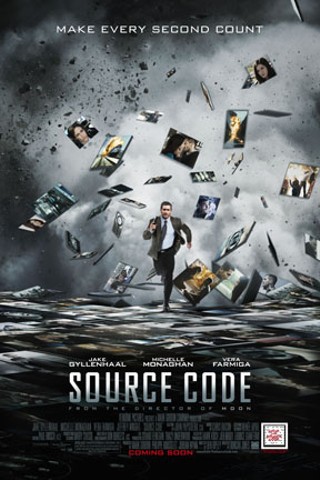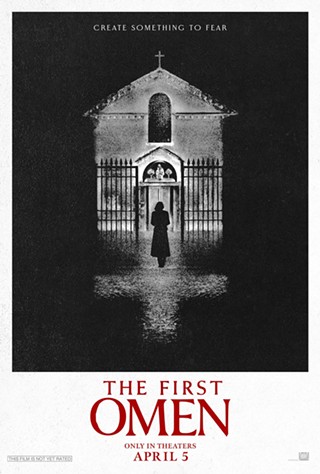Colter Stevens believes he's on a combat mission in Afghanistan. Then he wakes up on a commuter train, sitting across from a woman who clearly thinks he's someone else.
Before he can get his bearings, the train explodes, and Colter wakes up again, this time in some sort of holding cell.
He is asked if he's discovered the identity of the bomber—which he hasn't—and is given a set of instructions to make that his priority when he returns to the train.
Is it some sort of exercise? Not at all, Colter is told; that very train exploded earlier in the day in Chicago, and he has eight minutes to piece it all together. If he can, it might save countless lives down the line, because the train bombing is believed to be the first act in a wave of domestic terrorism.
That's a rough way to start the morning.
Before he can get more answers about where he is or what is really going on, Colter (Jake Gyllenhaal) is transported back into the body of a passenger on the train—a teacher named Sean, if he's put those pieces together correctly—and the eight minutes start over again.
While it might be easy to dismiss or at least categorize Source Code as a sci-fi Groundhog Day, the tone and the surrounding circumstances are far removed from that film. As it happens, Source Code may be more like North by Northwest than anything else: A man finds himself trapped in an extraordinary circumstance, and though he may not understand the motives behind his mission, he continues to play the part as instructed. The Midwest setting and the train don't hurt the comparison, either.
Over time, we learn, as Colter Stevens does, how all of this works: He was in a helicopter crash in Afghanistan, and although he's practically a vegetable, a small portion of his brain continues to process thoughts, so all of this retroactive detective work is happening inside of his own brain. He is, in fact, walking inside the source code, the short-term memory extracted from Sean, whose body Colter inhabits during his investigations. The segment is eight minutes long, because that's the extent of the short-term memory, all that remains of the moments before the explosion.
How Colter actually gets there is one of those details you either accept or you don't. But you should—and then you should promptly forget all about it. Source Code is a smartly assembled thriller, adding appropriate amounts of humor and action, while pausing long enough to address Colter's own story, which acts as the subplot to the mystery that runs throughout.
Inside his missions, he must eliminate suspects one by one, until he zeroes in on the culprit. Each visit to the train has a video-game feel to it: With each new turn, Colter becomes more and more familiar with the moves each potential suspect takes, predicting and avoiding the many hurdles in his path. However, he chooses not to avoid Christina (Michelle Monaghan), who might be the biggest distraction of all. Even though she believes she's talking to another person altogether, Colter finds himself drawn to Christina early, and thanks to the film's premise, often.
That sort of attraction is a variable the military didn't count on while assembling the source-code technology, and despite the objections of Rutledge (Jeffrey Wright) and Goodwin (Vera Farmiga), Colter doesn't always keep his eye on the ball, forcing him to retrace steps more than once, while in real time, the bomber is presumably getting farther and farther away.
With the exception of an atypically off-the-mark Jeffrey Wright, the performances in Source Code are worthwhile, with Gyllenhaal taking and commanding center stage. His career has been fairly odd for an actor who not only has legitimate chops, but also remarkable good looks. His recent attempts to cash in on that combination of talent and genetic fortune—Prince of Persia, Love and Other Drugs—have fallen flat, and he's looked a little foolish in the process. He's far more comfortable here, and it's a better fit from start to finish.
Gyllenhaal had been interested in Source Code for years, and handed the script to director Duncan Jones, fresh off the success of 2009's Moon. This represents a big step up in terms of public attention and expectations for Jones, who for his sophomore effort has managed to make a thrilling Hollywood action picture on a small budget—again raising the question of when studios will learn that $200 million can't buy them a better script. Here is a wholly implausible plot that nevertheless wraps us up because of its tight construction and easily digestible goals. It seems like such a small accomplishment, yet a studio movie that gets it right is harder and harder to find, perhaps especially in the sci-fi genre.
Source Code has flaws, but it recognizes its potential pitfalls and generally steers the other way. Jones presumably does not want to be the next hired-hand director, but he proves here that he can mold something clever and unique without much margin for error. His film has energy, style, intelligence, humor and reliable performances—and that's a tougher trick to accomplish than it may seem.











